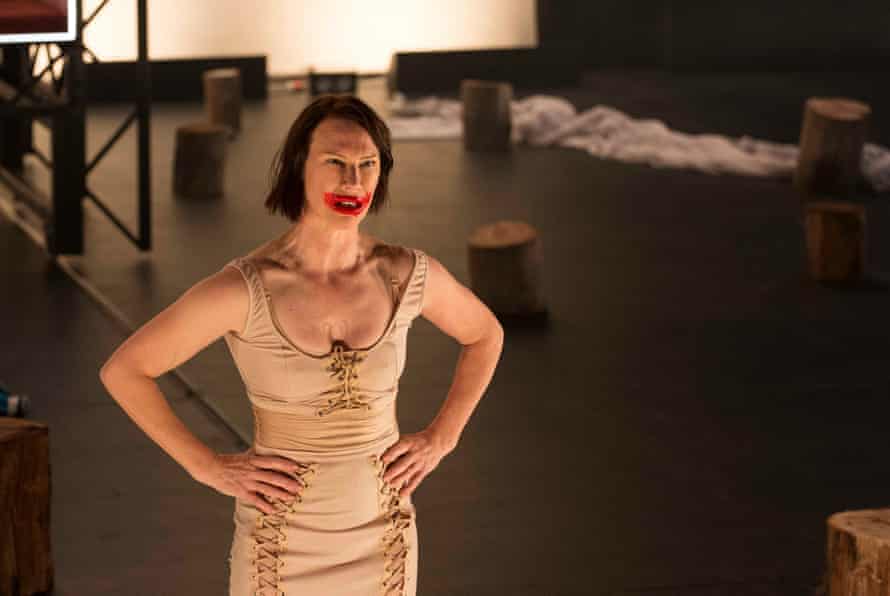Revolt She Said Revolt Again World Premiere
I 've lost count of how many women I've seen raped on stage. How many actors I've seen slapped, spit on, thrown to the ground. How many women I've seen killed. There's too many to keep concrete thought; too many to remember each actor, each play.
We forget, too often, the work that is demanded of the actor to make herself available for weeks in the rehearsal room, and then every night on stage, to fulfil someone else's vision – usually a man's, because directors are usually men – of a woman destroyed.
Alice Birch doesn't want this work to be unseen. Her angry and frantic play Revolt. She Said. Revolt Again, is an experimental work focused on using a feminist voice which is loud; a feminist voice which seeks to change the world not through small increments but through a revolution: through the destruction of language; through the destruction of society.
Over four distinct sections, each playing with form and language in a new way, always reacting harshly against the world, Revolt fractures the lines between performers and characters. In the second section of the play, directed here by Janice Muller in its Australian premiere, we watch an eerie and insidiously violent tableau under a sickly green light. Three women stare out to the audience – some sort of dysfunctional family – three generations of women struggling against the world.
And then the front begins to crack: Belinda McClory flounders over her lines.
She takes a step back, breathes, apologises for the work of it, questioning herself. The other two women on stage don't react: this breakage is of Birch's creation.
In this moment McClory is completely clothed, there are no men on stage, no bodies are touching – or even looking at each other – but her words are describing the violence of men against women, and in this splintering between McClory and her character Dinah I think of all of the women I've seen abused on stage, and see all of the stress and difficulty of this work that we too often don't remark on.
Birch and Muller build smaller breaks between character and actor throughout the work: a snicker here, a breath there, and the cast are endearing in these divisions. Revolt is given an audacious and ambitious production in Malthouse's biggest theatre space, and these ideas of theatre – and gender – as a construct are always present.

First performed in 2014, Revolt is the roar of young and angry feminism of women in their 20s grappling with the realities of the world for the first time; the ferocity that comes when you realise that, unlike what you've been taught, men and women aren't yet equal in society, and the world is made of more barriers than you'd ever realised. It is a constantly inverting work: calls of strength towards a revolution warp into methods of destruction against the women they are supposed to help.
Revolt is sometimes confused, Birch's yell not always coming through clear. Muller's direction looks to overwhelm, but occasional lapses in the energy allow us too much time to step back – and re-entry into the work can be difficult. But if it isn't always completely realised, there is an urgency to the work, and it poses a deeply fascinating challenge to its audience, both in the watching and in the intellect it asks for afterwards.
If the production forces me to think on the prevalence of violence against women in Australian theatre, so too does it remind me of the strength of feminist performance and critique in this country. Emma Valente's lighting is uncompromisingly vivid, evoking the colour palates she often plays with with artists like Adena Jacobs and her own company, The Rabble. Marg Horwell's design sees the opening scenes in a soft pink curtained box, playing off the design of The Second Woman; an oversized peach dress filled with balls creates a misshapen lump that views women's bodies in much the same way as Monster Body; she even crafts in a nod to the most recent Mia Freedman controversy. If occasionally Birch's Britishness sits too heavily in the text, the actors and design are always there to remind us this is an Australian story, too. And it's a story of work that is yet to be done.
In the play's final moments, a young black woman (Elizabeth Esguerra), sadly, tiredly – but not without hope – stares into the audience. "Who knew that life could be so awful," she says, more statement than question. A smatter of laughs comes from the audience, but only from men. The women know it to be true.
Source: https://www.theguardian.com/stage/2017/jun/22/revolt-she-said-revolt-again
0 Response to "Revolt She Said Revolt Again World Premiere"
Post a Comment